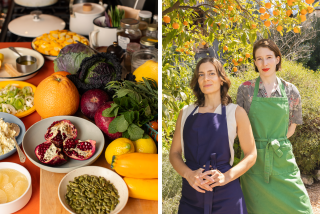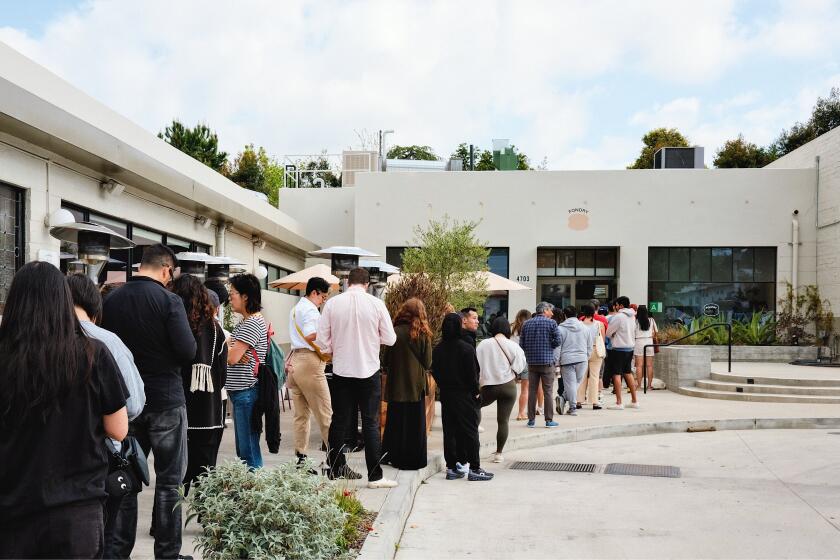Farmers Markets: Picking the best plums and Pluots
Most of the best plums and Pluots — sweet or sweet-tart, with rich flavor — cluster in midseason, from mid-July to mid-August. Even now there are plenty of mediocrities, however, so it pays to keep a list of what to look for or avoid.
On one of my first visits to a plum orchard long ago I plucked a Blackamber and was about to bite into it when the farmer shouted, “Don’t eat that!”
Why not? I asked. Had the trees just been sprayed?
“No,” he said, “those are shipping plums, not eating plums.”
I sampled the fruit anyway and realized what he meant. It was as rubbery as a tennis ball and about as tasty. Others in that class, bred for cross-country transport and storage, and in season now, include Hiromi Red, Fortune and (a bit better) Friar.
For good classic plums over the next month, look for Burgundy (dark maroon skin and flesh; available from Arnett, Cirone and Honey Crisp); Satsuma (speckled skin, red flesh; from Garcia Organic, Tenerelli and Rieger); Mariposa (speckled skin, red flesh; from Mud Creek, Truman Kennedy, Burkart and Cirone); Laroda (purple skin, amber flesh, rich flavor; from Asdoorian, Burkart and Tenerelli); and Wickson and Kelsey (green, yellow or red skin, depending on ripeness; from Truman Kennedy, Olson, Arnulfo Garcia, K&K Ranch). In early August comes Elephant Heart, with speckled skin and deep purple flesh, from Kennedy, Rieger and Cirone.
The best Pluots — plum-apricot hybrids, predominantly plum — arguably outclass plums. Flavor Queen, with yellow skin and honeyed, luscious yellow flesh, starts around now but has so frustrated farmers by its cracking and bruising that many have yanked their trees. Look for them from Honey Crisp, Sweet Tree, Arnett, Asdoorian and Harry Nicholas. Its “replacement,” Emerald Gem, is a touch firmer and greener, and almost as good (from Arnett).
Flavor Queen is sweet but not complex; its consort, Flavor King, has the whole package, including intense flavor and lingering aftertaste. It usually ripens in late July, but in this screwy season some are already showing up at markets, at Jay Scott’s stand. Look for them in a week or two from Honey Crisp, Ken Lee, Sweet Tree and Arnett.
Some growers (Jimenez, Mud Creek, Avila) are selling what they call “greengage” plums, reputed to be the world’s finest, but they actually have Asian greengages from a different species (Prunus salicina) and not the celebrated European greengages (which are P. domestica). It is easy to tell the difference, because the Asian or Japanese forms have tart skin and thin leaves; European gages have thicker, fuzzier leaves and no tartness in the skin. Some Asian greengages are sweet, but none are supersweet and intensely flavored like European greengages. In about a week, Windrose Farm of Paso Robles will bring a box or two of real European greengages, the first crop from their young trees, to the Santa Monica Wednesday or Hollywood market.
Amaize corn
There’s been a lot of buzz in the produce world recently about Amaize corn, which just started selling at Gelson’s. It’s the sweetest white corn I’ve ever tasted, with explosively crunchy kernels. Conventionally bred by Crookham, based in Caldwell, Idaho, and just marketed commercially for the last two years, it’s grown in Brentwood, east of San Francisco, which is famous for the high quality of its corn.
I can appreciate very sweet corn like Amaize but personally prefer less intensely sweet varieties with more traditional corn flavor. For the past dozen years, Shu and Debby Takikawa, who call their farm in Santa Ynez the Garden of ..... , have grown a fantastic yellow variety with just the right balance of corn flavor and sweetness. Many customers, as well as other farmers, have asked for the name of the variety, but the Takikawas always declined to reveal it until now: Merlin, bred by Mesa Maize in Colorado. The company was purchased by a new owner who no longer sells those seeds, and the Takikawas are coy about where they got theirs, to avoid tipping off competing farmers at the Mar Vista, Hollywood and Santa Barbara markets.
There aren’t very many growers who still raise “standard” corn varieties, which have more sugar than field corn intended for livestock, but less than modern enhanced or supersweet varieties. Valdivia Farms of Carlsbad still grows Silver Queen, a standard white variety from 1960, and sells at many farmers markets, including Santa Monica on Wednesdays, Hollywood, Encino and South Pasadena. It’s a great variety if eaten fresh from the field, but the sugars in this and other standard varieties quickly convert to starch, so it loses its prime eating quality after a few days.
Suit against farmers group dropped
The plaintiffs in an antitrust lawsuit against the Santa Barbara Certified Farmers Market Assn. dropped the case on Wednesday as Santa Barbara Superior Court Judge Thomas Anderle was preparing to rule on whether to allow the suit to proceed to trial. The attorney for the defendants, Timothy J. Trager, confirmed the disposition of the case.
The suit, filed in December, embroiled several prominent farmers who also sell at markets in the Los Angeles area, including John de Bruin of Dey Dey’s Best Beef Ever, one of three plaintiffs, and Molly Gean of Harry’s Berries, president of the market association’s board.
The suit alleged that the market board violated California’s antitrust and unfair business practice laws by favoring certain members of the association, including “larger, corporate, and out-of-county based farmers,” and excluding local independent farmers from access to the most lucrative markets, such as the Saturday Santa Barbara venue.
The board consists of local small farmers. Some, like Gean of Harry’s Berries and Diane Tuomey of Lily’s Eggs, are located outside Santa Barbara County but are in Ventura County and are actually closer to the city of Santa Barbara than two of the three plaintiffs, who are from Lompoc.
Two of the three plaintiffs agreed to dismiss the case with prejudice, meaning that they can’t reopen the case, and the market association board agreed to waive filing costs for dropping the suit, several thousand dollars; the lead plaintiffs, Jeff Hendrickson and Roxanne Renner of Santa Rita Flower Farm, dismissed the case without prejudice, keeping the option to file another suit in the future.
Gean said Wednesday night, as the settlement was in progress, that “it’s a great relief” for the board, which spent “$60,000 to $70,000” fighting the case.
Many farmers complain that they can’t get into the best markets, such as Santa Barbara and Santa Monica’s Wednesday market. Successful farmers markets generally have limited room and can’t let in everybody who applies. Realistically, those who grow crops that are already well represented at markets, such as citrus and avocados, may never get in.
It is unclear whether a judge or jury would second-guess the decisions of market managers about whom to include. There are many factors that managers juggle, such as produce quality, organic status, the demand for a crop, price and value, and personal integrity. Farmers market management is not a science but an art, and each manager has to make decisions based on their instincts and the individual circumstances of their markets.
20 years in Santa Clarita
The Santa Clarita farmers market will celebrate its 20th anniversary this Sunday. Medium-sized, with about 40 vendors, and primarily focused on produce, it’s by far the best market in northern Los Angeles County. The festivities will feature music, activities for children and demonstrations by chefs, including Amelia Saltsman, author of “The Santa Monica Farmers’ Market Cookbook,” and Tim Kilcoyne of Scratch food truck.
More to Read
Eat your way across L.A.
Get our weekly Tasting Notes newsletter for reviews, news and more.
You may occasionally receive promotional content from the Los Angeles Times.






